Are you curious about protein powder consumption in pregnancy?
Do you want to know if you’re getting enough protein to support your baby?
You’re in the right place.
Today, you’ll learn
- Is it safe to take protein powder while pregnant?
- How much protein should you get throughout your gestation?
- What are the best alternatives to protein powder?
Let’s dive right in.
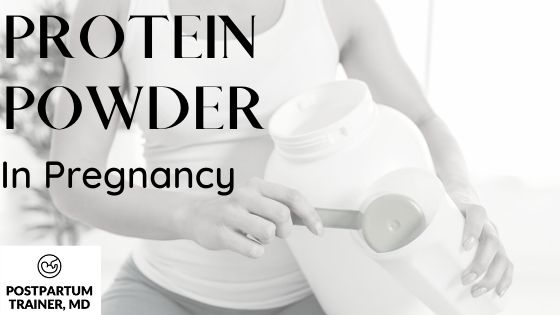
What is Protein Powder?
Protein powder is a supplement that concentrates protein-rich foods into a dissolvable mixture.
They are made from different kinds of foods such as
- Milk products (whey, casein)
- Peas,
- Rice, and
- Soy
Just to name a few.
Often times, protein powders are also fortified with other essential nutrients, making them similar to a multivitamin.
Is it safe to take protein powder while pregnant?
It is generally safe to take protein powder during pregnancy. But before you take any kind of supplement you need to do two things.
The first is to make sure to ask your doctor first.
Secondly, protein powder should be treated as a supplement, and not as a neccessity.
Ask yourself: Do you actually need to take protein powder?
You may or may not need it.
Who Should Take Protein Powder?
You should consider taking protein powder supplementation in pregnancy if you cannot get a sufficient amount of protein in your regular diet.
With that said, this likely represents a small percentage of women.
How much protein should a pregnant woman get?
The minimum recommended daily allowance (RDA) of protein for healthy adults is 50 grams per day.
In general, most people are able to get this number fairly easily.
But during pregnancy, it’s a good idea to get more than 50 grams a day to help support the growth of your baby.
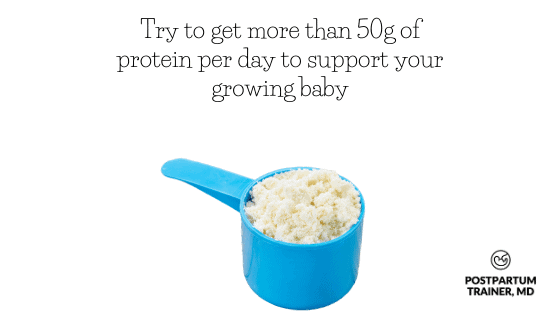
As you could imagine, protein needs increase throughout the pregnancy.
So how much should you get?
One study recommends eating up to 0.7g of protein per pound of bodyweight.
That means that a 135lb woman should consume up to 85 grams of protein per day, by the time she reaches the third trimester.
The National Academy of Medicine on the other hand recommends a dietary reference intake for pregnant women of 1.1 g/kg/day protein, which is about 0.5 g of protein, per pound of bodyweight.
Using the same 135lb woman again, that’s about 65 grams of protein per day.
So if you struggle to get at least 0.5 g of protein per pound of body weight, talk with your doctor to see if supplementation is right for you.
Benefits of Protein Powder During Pregnancy
If you decide to use protein supplementation, there are a few benefits that it offers.
Convenience
Protein powders are a convenient way of increasing your protein intake throughout the day.
Often times its hard to reach the recommended daily allowance of protein with regular food alone.
With a protein supplement, all you have to do is add one scoop of powder to a glass of water or almond milk to have a high protein food.
Most protein powder supplements contain anywhere from 15-30 grams of protein per serving.
Increased Nutrient Intake
Also, many women experience nausea and vomiting in the first trimester. This can lead to an aversion to food, decreasing your overall nutrient intake.
As such, protein powder supplementation can help improve your nutritional status if you are unable to tolerate foods.
It is easy to prepare and can help keep you satiated.
Lean Muscle Tissue
Lastly, protein is the most important macronutrient to help build and maintain lean muscle mass.
This is especially important if you are exercising in the prenatal period.
*By the way, exercise is something you should definitely be doing while pregnant (as long as you are cleared by your doctor to do so).
What protein powder is safe during pregnancy?
It’s difficult to give specific recommendations, but there are a few things to consider when choosing a protein powder.
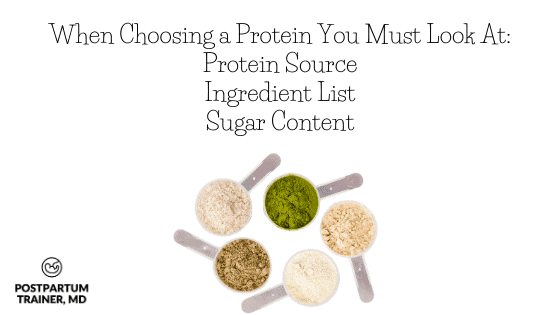
If you do decide to use protein powder, then here are a few things you should look out for.
Here are the main things to consider:
Protein Source
First is the type of protein which can come from many different sources such as:
- Whey
- Casein
- Egg
- Pea
- Brown Rice
- Soy
- Hemp
- Collagen, or even
- Bone Broth
Pick one based on your dietary preferences, as some are animal-based (whey, casein, egg, collagen, and bone broth) while the rest are plant-based (pea, rice, soy, and hemp).
Sugar Content
The next thing you should look for is sugar content. Some protein powders are loaded with sugars, and added sweeteners for taste.
To stay on the safe side, go with unsweetened protein powders.
You can easily add other ingredients to give your shake a lot of flavor.
More on that below.
Ingredient List
The third thing to look at is the number of ingredients.
Just like food, it’s best to keep ingredients to a minimum. In general, go with protein powders with 3 or less ingredients, total.
I usually drink Myprotein’s pea protein or brown rice protein powder.
What About Contamination?
Third-party companies have detected that many different kinds of protein powders can contain contaminants like BPA and Heavy metals.
Unfortunately, protein powders are a supplement, and therefore not regulated by the FDA.
With that said, having detectable levels of a contaminant doesn’t necessarily mean that it is harmful.
Several organic fruits and vegetables can have trace levels of heavy metals which they pick up from the soil.
I wish I had a clearer answer for you – but we simply don’t have studies looking into this.
So, the key take-away is:
- Always check the label and go for one with minimal amounts of ingredients,
- Check the sugar content, go unflavored if needed, and
- Pick a reputable trusted brand
How do you take protein powder?
Protein powder can be taken in many different ways.
In general, you should not need more than 1 scoop per day. Depending on how much protein you get through regular foods, you may even need less than 1 scoop per day.
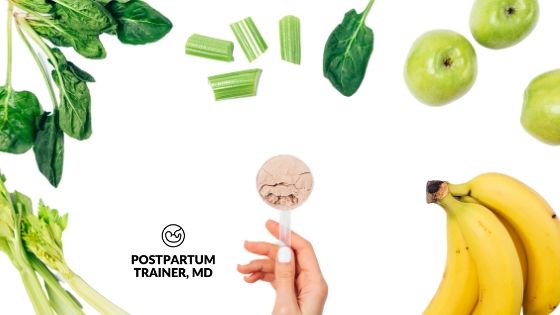
Here are the most ways to consume the protein powder:
- Mix it with 8-12 ounces of water
- Mix it with 8-12 ounces of your choice of milk (almond, cow, coconut, rice etc)
- Mix it with oatmeal
- Mix it in your bowl of cereal
- Make a homemade protein shake with fruits and veggies
The last one is my favorite.
Homemade Protein Shake For Pregnancy
A simple way to make a nutritious homemade protein shake is to combine:
- 8 ounces of almond milk
- 1/4 cup of blueberries
- 1 frozen banana
- 1 tbsp of almond butter
- 1/4 teaspoon of cinnamon
- 1 scoop of protein powder or 1/4 cup of greek yogurt
This protein shake can provide 20-25 grams of protein in one sitting and it tastes delicious!
How Else Can I increase my protein during pregnancy?
So what foods are high in protein that you can eat in pregnancy?
Here are some of the best sources of protein:
- Chicken Breast
- Turkey
- Cooked Salmon
- Greek Yogurt
- Beans
- Legumes
- Quinoa
- Nut Butters
Any of these foods can be a great alternative to protein powder supplementation in pregnancy.
For more information on protein intake in pregnancy check out the Fit Pregnancy Diet.
What protein should you avoid when pregnant?
It is also important that you avoid certain types of protein-rich foods in pregnancy too. Your providers should have gone over these foods with you during the initial prenatal visit.
These include.
- High mercury fish (swordfish, mackerel, shark)
- Under-cooked fish (sushi)
- Under-cooked deli meat (cold cuts)
- Raw eggs
- Soft cheeses (feta, brie, ricotta, cream, cottage)
- Unpasteurized milk
Consuming these foods puts you at risk of developing Listeriosis.
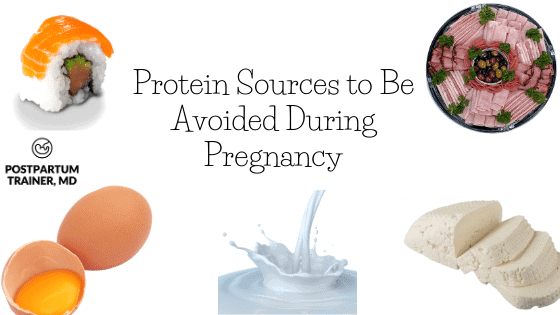
Related Questions
Does protein powder increase weight during pregnancy?
Protein powder by itself does not increase weight gain in pregnancy.
Excessive consumption of calories (which protein powder can contribute to) is the biggest cause of weight gain.
So what should you do?
It is important that you only increase your caloric intake by about 400-500 calories per day to support your growing baby.
If you consume more than 2200-2400 calories per day, then adding protein powder on top of that can certainly increase your weight.
Can You Get Too Much Protein During Pregnancy?
It is possible to consume too much protein in pregnancy. Especially if you are taking protein powder supplements on top of a varied diet.
Excess protein consumption can lead to weight gain and all of the complications associated with excess weight.
In addition, one study found that a high protein diet can increase the risk of a low birth weight baby.
Just to be on the safe side, stick to the recommended guidelines of 0.5 – 0.7 grams of protein, per pound of body weight.
What happens if a pregnant woman doesn’t get enough protein?
Protein is necessary for muscle synthesis as well as synthesis of enzymes, hormones, and other bodily tissues.
Pregnancy also increases the demand of protein utilization to support the placenta and growing fetus.
Inadequate protein intake has been associated with an increased risk of a preterm birth and a low birth weight baby.
Final Words On Protein Supplementation In Pregnancy
Protein powder supplementation in pregnancy is generally safe, but it is important for you to decide if you actually need it.
Aside from convenience and ease of use, protein supplements don’t have any other beneficial effects on your pregnancy.
In other words, it is still important that you consume a healthy, well-varied diet.
So…
Have you taken protein powder in pregnancy?
Why or why not?
Comment below and let me know.
Related Nutrition Posts In Pregnancy/Postpartum
- How to Get Rid of Baby Fat
- How To Get In Shape While Pregnant [How To Do It Safely]
- The Fit Pregnancy Diet
Get Four Free Workouts To Help Strengthen Your Pelvic Floor & Heal Your Mommy Tummy!

Brittany Robles, MD, MPH, CPT
Brittany Robles is a full-time OBGYN physician, a NASM certified trainer, and a prenatal and postnatal fitness specialist. She holds a Master of Public Health degree in maternal health with a special interest in exercise and nutrition. She is also the co-author of The White Coat Trainer. Learn more about her here.
Sharing is Caring – Send This To A Mom In Need!
